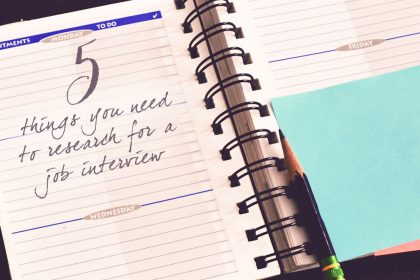How to answer that dreaded interview question – ‘Do you have any questions for us?’
Want to really shine at your job interview? Make sure you’re ready for the dreaded “Do you have any questions for us?” Here are five questions you can ask.
Interviews are pretty much always anxiety inducing. No matter how many you sit through, or how confident you are you’re the right person for the job, the act of sitting in front of a panel and concisely, articulately and personably answering their questions always causes a few butterflies.
We often spend quite a bit of time preparing ourselves for the questions we think we’ll be asked. We research the company, revise cognitive behavioural question examples, we practice the STAR technique, we ask a friend or two to give us a mock and a pep talk.
But how much time do we spend thinking about what we want to ask the interview panel?
Do you have any questions for us?
I’ve always found it interesting – and a little disappointing – when interviewing a candidate and they don’t have any questions to ask at the end of the interview.
This is the perfect opportunity to really engage with the panel, gain some insights into the role you apparently really want and demonstrate a wide number of things about you. Namely:
- You’ve done your research.
- You want to know more about the potential manager/colleagues/workplace.
- You’re interested in what the day to day of the role looks like.
- You’re curious about what’s on the horizon for the role and company in general.
- You want to know what to expect next.
This part of the interview is a great opportunity to de-escalate some of the tension or anxiety that often gets built up around an interview, for both the interviewee and the interviewers. Your questions don’t have to be completely formal, and it’s okay to mix it up a bit, but you definitely need to ask something.
What questions should you be asking?
There’s a long list of questions that you definitely shouldn’t ask at this stage. Anything around salary, employee perks, annual leave, or progression routes should be left for when the job offer is on the table or you’ve passed any probation periods.
There’s a few other questions I recommend asking before accepting a job offer, which you can read about here.
The questions you should be asking need to be a mix of demonstrating you’re engaged with the role and the company, but not be too intimidating as to throw off the interview panel and leave them unable to offer answers.
Here are five of my favourite examples that I both enjoy asking, and being asked, no matter what side of the table I’m on.
1) In my research, I read XYZ article/white paper/press release about the company. I found this particularly interesting and wondered how this role or the wider team contribute to this?
This question gives you the chance to show you’ve done your research, and that it extended beyond checking out the company website. It also allows you to open up a conversation about the type of work you’ll be doing, and demonstrate your interest in the ‘bigger picture’ of the team.
2) What have been some of the main challenges for the team this year?
This isn’t a question that everyone expects to be asked, but I personally think it’s a good one. We often think we have to shy away from ‘difficult’ questions or anything that might ask an employer to talk negatively about the role or company.
This question steers away from this but opens up an honest conversation. It demonstrates you understand that not every opportunity is golden, and you’re happy to turn focus and discussions towards problem-solving. Depending on the answer, it also gives you the chance to learn more about what you might potentially be stepping into – and if you want to.
3) Why has the role become available?
Sometimes this is immediately obvious and advertised on the job advert, but sometimes it isn’t. Even worse, employers could be a little sketchy about advertising why the role has become available. Along with the why has the role become available, you might also want to ask them how long has it been advertised for.
If you really want to gain insights into the type of atmosphere you’re stepping into, you could also ask how long the predecessor was in the role for before they left. Finding out that a role has been vacant for a long time, or has had a few previous individuals cycle through it is a big red flag for what the company culture might be like. Important information to know.
4) What’s the management structure like across the organisation?
If you’re deeply curious about progression, this is a better question to ask to help build a picture of what the company looks like at a managerial level. It’s always good to know if there are different layers you could move up into.
Personally, I much prefer a flat and clear management structure – it just helps me know who and where I need to go to for advice, guidance or support. This may mean it takes longer to move up in a company, but at least I know what (and who) I’m dealing with.
5) What budget/software resourcing will be made available for me to ensure I can perform effectively in the role?
We often take it for granted that if someone is advertising for a role, everything will be in place for us that we need, in order to do that role effectively. I can tell you from repeated experience, this isn’t always the case. Especially when you work in a role or sector that is seen as an ‘added value’ component rather than core business.
Think about your current job and some of the reasons you’re seeking a change. I’m willing to bet some of it will come down to this factor. Think about what’s missing in your current role that stops you from being the best, and ask the questions you need, to make sure you aren’t stepping into a similar scenario.
Some extra tips for getting these questions right
Here are some extra tips for getting these questions right:
- Follow up on anything from the job ad you’d like clarity on – did they mention travel? Support with additional qualifications? Is it part time or full time? Now is the time to ask so you can make an informed decision should you be offered the role!
- Make sure you ask open-ended questions – what, when, who, where and how. Keep your questions open-ended so you can have a conversation.
- Refer back to questions you’ve been asked and/or something referenced in the interview – something will have undoubtedly come up during the interview that peaked your interest. If there’s space, I ask questions about this at the time they come up. If there isn’t, I make a little note and come back to it at the end.
- Do ask the ‘what are the next steps’ question – always, always always. Make sure you know what to expect, so you aren’t left in limbo and can follow up at the appropriate time.
Elaine Mead is a passionate education and careers consultant, and is particularly interested in empowering young women to be their professional best. You can follow her on Twitter and read more of her articles on medium.
Photo by Daniel McCullough










